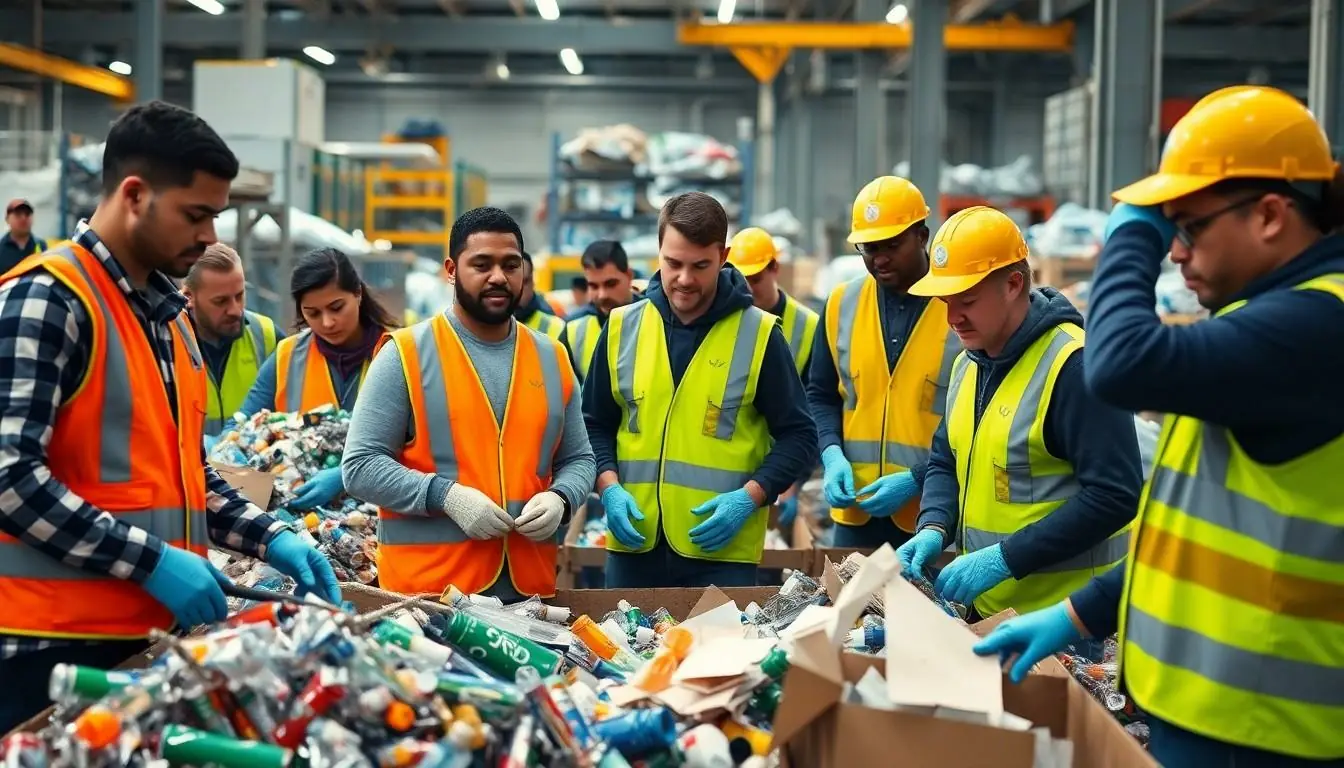In a world drowning in waste, the recycling business isn’t just a trend—it’s a superhero in disguise. Who knew that turning trash into treasure could be so profitable? With the right approach, anyone can join the ranks of eco-warriors while cashing in on the green revolution.
Table of Contents
ToggleOverview of the Recycling Business
The recycling business plays a crucial role in managing waste effectively. It addresses the pressing issue of increasing waste generation by transforming materials into reusable resources. Many businesses engage in recycling various materials, including plastics, metals, paper, and electronics. This sector not only promotes environmental sustainability but also generates significant economic benefits.
In the United States, approximately 35% of waste is recycled as of recent statistics. The recycling market has grown rapidly, with a projected increase in revenue reaching $100 billion by 2024. Businesses that focus on recycling contribute to job creation, employing over 1.1 million workers nationwide in various roles, such as sorting, processing, and transporting recyclable materials.
Different models exist within the recycling industry. Curbside collection programs collect recyclables directly from homes, enhancing convenience for residents. Drop-off centers provide options for individuals to recycle at designated locations. Manufacturing facilities often utilize recycled materials in their production processes, integrating sustainability into their supply chains.
The profitability of recycling businesses hinges on efficient operations and effective marketing. Establishing strong partnerships with local governments and businesses can yield mutually beneficial results. Offering incentives for proper disposal and recycling practices enhances community participation and boosts overall recycling rates.
As consumer awareness of environmental issues increases, the demand for recycling services grows. Companies that embrace innovative recycling solutions position themselves favorably in the evolving market, aligning profit with purpose.
Importance of Recycling

Recycling plays a crucial role in ensuring environmental sustainability and supporting economic growth. Understanding its impact encourages more individuals and businesses to engage in recycling practices.
Environmental Benefits
Recycling significantly reduces landfill waste, minimizing pollution. About 35% of waste in the United States gets recycled, helping to conserve natural resources and energy. Using recycled materials instead of virgin resources cuts greenhouse gas emissions, which is vital in combating climate change. Furthermore, recycling preserves biodiversity by limiting the need for extraction and refining processes that disrupt ecosystems. Enhanced resource recovery promotes a circular economy, where materials are reused continually, reducing the demand for new resources.
Economic Impact
The recycling market is a rapidly growing sector, expected to reach $100 billion by 2024. Over 1.1 million workers are employed in diverse roles within the recycling industry, generating substantial job opportunities. Increased consumer awareness drives demand for recycling services, creating additional avenues for revenue. Recycling businesses often benefit from lower production costs through the use of recycled materials, contributing to overall economic efficiency. Strengthening partnerships with local governments and businesses enhances the sustainability of recycling operations while fostering community support and investment.
Types of Recycling Businesses
Different types of recycling businesses play essential roles in waste management. These businesses contribute to sustainability by repurposing materials into valuable resources.
Municipal Recycling Programs
Municipal recycling programs typically operate under local government management. They collect recyclable materials from residential areas through curbside pickup or drop-off locations. Most programs involve single-stream recycling, allowing residents to mix various materials without sorting. These initiatives improve community participation and make recycling accessible to everyone. According to the U.S. Environmental Protection Agency, about 25% of recyclable materials end up in landfills, highlighting the importance of effective municipal programs. By incentivizing recycling, local governments can enhance environmental compliance and citizen engagement.
Private Recycling Companies
Private recycling companies enhance market competition and innovation. These companies often focus on specialized materials, such as electronics or construction debris, providing targeted services that municipal programs may lack. Their operations may include collection, processing, and resale of recycled materials, improving revenue streams. Many private firms collaborate with businesses for tailored recycling solutions, thus meeting diverse needs. A significant number of these companies also prioritize sustainable practices, contributing to the overall demand for recycling services. Collectively, they play a critical role in the growing recycling industry projected to reach $100 billion in revenue by 2024.
Challenges in the Recycling Industry
The recycling industry faces several significant challenges that impact its efficiency and effectiveness.
Contamination Issues
Contamination poses a major hurdle for recycling efforts. When non-recyclable materials mix with recyclables, sorting becomes difficult. This contamination can lead to entire batches being sent to landfills rather than being recycled. For instance, contaminated paper or plastics can result in lower-quality end products. Around 25% of recyclable materials end up discarded due to contamination, highlighting the urgent need for consumer education and proper disposal practices. Addressing this issue requires cooperation between consumers, businesses, and municipalities to ensure materials are correctly sorted.
Market Fluctuations
Market fluctuations significantly affect the recycling industry’s profitability. Prices for recyclable materials can experience rapid changes based on global demand and supply dynamics. For example, China’s import restrictions on certain recyclable materials since 2018 have caused disruptions in the recycling market. Volatile prices impact recycling companies’ ability to predict revenues and allocate resources effectively. In 2021, the U.S. recycling market saw price drops of up to 40% for some materials, forcing many businesses to adapt quickly. Understanding these market conditions helps companies develop strategies to navigate uncertainties and sustain operations effectively.
Future Trends in Recycling
The recycling industry is evolving rapidly, driven by new technologies and regulatory changes. These trends shape the future of waste management, enhancing efficiency and sustainability.
Technological Innovations
Emerging technologies impact recycling significantly. Automation in sorting processes increases efficiency, reducing contamination rates. Advanced robotics handle complex sorting tasks, improving the quality of materials collected. Data analytics play a crucial role, allowing companies to optimize operations and track material flows. Moreover, innovations in chemical recycling enable the processing of plastics that traditional methods often cannot handle. Such technologies enhance the economic viability of recycling operations, supporting the growing demand for sustainable practices.
Policy Changes
Stricter regulations influence recycling practices. Governments are implementing policies that encourage recycling and penalize wasteful habits. Extended producer responsibility laws hold manufacturers accountable for packaging waste, prompting them to invest in recyclable materials. Additionally, incentive programs at the local level reward communities that adopt sustainable waste management practices. These policies create a favorable environment for recycling businesses to thrive, fostering innovation and increasing public participation in recycling efforts. With these changes, the potential for growth in the recycling sector remains robust.
The recycling business stands at a pivotal point where environmental necessity meets economic opportunity. As awareness grows and technology advances the potential for profit within this sector expands. Innovations and regulatory support are shaping a more sustainable future while addressing pressing waste management challenges.
With the right strategies in place recycling businesses can thrive and contribute significantly to both the economy and the environment. As they navigate hurdles like contamination and market fluctuations the focus on efficiency and partnerships will be crucial. The future of recycling holds promise and those who engage with this industry can play an essential role in fostering a greener planet.





